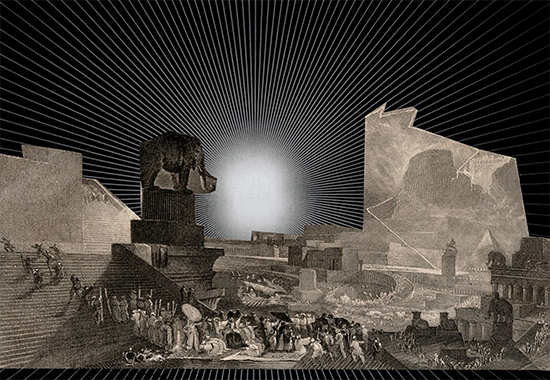Critical Collapsology:
Theory and the Ends of Worlds Instructor: Richard Hames Date & Time: February 23rd, March 2nd, 9th, 16th 09:00-11:30 ET

DESCRIPTION: Collapsology has been one of the most strikingly underthought areas of the social sciences. Conceptually surrounded by the problem of the ‘indeterminate totality,’ as well as the hackneyed quality of invocations of ‘the apocalypse,’ the practice of studying social disintegration remained fragmentary and ad hoc. We still need new critical approaches to this canon and its implications, as participants in a society whose future is highly uncertain and whose historical condition of possibility was itself the destruction of other societies. What do we owe future societies when we consider the prospect of collapse? What do we owe past societies? In this Seminar, we will explore the field of collapsology and what it means for us. Crucially, these will not be taken as two separate questions but as a single field of concern. Can we embed ‘what it means for us’ into our accounts of how collapse actually occurs, integrating the normative and descriptive layers of theory?
The careful consideration of collapse is of special importance to anyone who wishes to work with projects that operate over spans of time that exceed a few decades. Anyone with a radical political project, for instance, must contend with the possibility of a rapid period of transformation that makes their project not only more operationally challenging but potentially conceptually incoherent. Yet noticing the possibility of our own obsolescence short of our outright extinction also opens a rich philosophical terrain. What does it mean to have values that are once historically contingent and claim their universality to be unrealised? What kind of medium is history itself and how does it resist us? This question is at once densely theoretical and eminently practical, demanding analyses of key questions in ethics and metaethics but also the challenge of designing new institutions that might carry forward revised goals, or at least encase them sufficiently so they can be transported to our descendants.
Session 1: An introduction to ‘traditional collapsology’. In this introductory lecture, we will discuss some major theories for why societies fall apart, which form much of the basis for current ideas about collapse. These are focused on moral, environmental, demographic, and energetic reasons. We will introduce the philosophical problem of the ‘indeterminate totality’ as well as the way a discipline of ‘collapsology’ has functioned on the outside of more conventional social sciences.
Readings (excerpts): Edward Gibbon, Decline and Fall of the Roman Empire; Oswald Spengler, Decline of the West; Alfred Toynbee, A Study of History; Abd al-Rahman Ibn Khaldun, Muqaddima; Jared Diamond, Collapse: How Societies Choose to Succeed or Fail; Patricia McAnany & Norman Yoffee, Questioning Collapse; Niall Ferguson, Doom: The Politics of Catastrophe; John Michael Greer, The Onset of Catabolic Collapse; Carroll Quigley, The Evolution of Civilizations.
Session 2: Recent developments in Existential Risk Studies. Much has recently been achieved in overcoming the weaknesses of traditional collapsology. In this second session we will look into some of the more nuanced approaches to questions of risk and the development of multi-causal explanations for collapse. Surveying research from CSER and other major institutions, we will take a skeptical look at the very notion of collapse and offer a broader taxonomy of periods of rapid social transformation and loss of agency.
Readings (excerpts): Joseph Tainter, Collapse of Complex Societies; Peter Turchin, Ages of Discord; Florian Jehn, Mapping Out Collapse Research; Graeme S. Cumming and Garry D. Peterson, Unifying Research on Social–Ecological Resilience and Collapse; SJ Beard, Clarissa Rios Rojas, and Catherine Richards, The Era of Global Risk; Luke Kemp, Goliath’s Curse; Nafez Ahmed, Failing States, Collapsing Systems; Samo Burja, “Why Civilisations Collapse”; Frank Kermode, The Sense of an Ending; Guy Middleton, Understanding Collapse; Toby Ord, The Precipice; Sabin Roman, “Historical Dynamics of the Chinese Dynasties.”
Session 3: Applied collapsology. The third session will look in detail at the changing tactics of social destruction, from the theory of the imposition of the Eurocene to early counterinsurgency tactics in the Americas. We look at the development of lineages of strategic destruction and the kinds of social structure they imply. What relationship does this darker canon of induced destruction—which arguably forms the majority of 20th century collapses—have with the more stately canon we were introduced to?
Readings (excerpts): Jairus Grove, Savage Ecology; Nick Estes, Our History Is the Future; Susan Buck-Morss, Dreamworld and Catastrophe; A. Dirk Moses, The Problems of Genocide; Jeremy Black, Insurgency and Counterinsurgency.
Session 4: An introduction to Critical Collapsology. In the final session, we will discuss a framework that addresses many of the problems raised in the previous sessions. The critical aspect of collapsology emerges from a reading of institutional forms as at once producing affordances, constraining developments, and entailing normative tasks for agents to accomplish. Developing these aspects of the history of collapse will allow us to make common cause with feminist and Marxist theories of social reproduction, particularly those that relate to the question of the ‘mute compulsion’ of capitalism as an economic system.
Readings (excerpts): Tithi Bhattacharya, Social Reproduction Theory; Søren Mau, Mute Compulsion; Déborah Danowski and Eduardo Viveiros de Castro, The Ends of the World; Peter Sloterdijk, Spheres v. III; Joseph Schumpeter, Capitalism, Socialism, and Democracy; Bob Jessop, “Ordoliberalism and Neoliberalization”.
IMAGE: R.H. Quaytman, Untitled 2024.
To see The New Centre Refund Policy CLICK HERE.
To see The New Centre Refund Policy CLICK HERE.